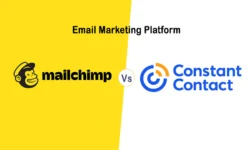As a small business owner, you know the importance of staying ahead of the curve when it comes to technology. The right Learning Management System (LMS) can make a world of difference for your organisation, offering increased productivity and efficiency.
But with so many LMS solutions on the market, it can be hard to decide which one is best for you. To help, we’ve rounded up the 15 best LMS solutions for small businesses. Here, you’ll find a comprehensive list of options along with pricing and feature details, so you can easily compare and contrast the options available and choose the one that’s right for your organisation.
Table of Contents
What Is an LMS & Why Should Small Businesses Use One?
Are you a small business owner looking for a way to easily manage and deliver online training to your employees? Then you need an Learning Management System (LMS). An LMS is a comprehensive software platform that helps manage and automate the entire ‘training lifecycle’: from creating and uploading courses, managing learners, tracking user progress, providing feedback, and issuing completion certificates.
But even more than training staff, an LMS can actually save your business time and money. A good LMS will make it easier for employees to learn the new skills they need quickly; help standardise processes across departments; enable performance management; reduce the time it takes to onboard new staff; track learner progress in real-time; eliminate physical paperwork; and generate reports on learning outcomes. All of this leads to improved efficiency overall, so you can get more done in less time.
In short: investing in an LMS will not only make it easier for you to train your team, but it can also help improve workflow efficiency overall—leading to increased productivity and profitability in the long run.
Key Benefits of Using Learning Management Systems (LMS)
Are you wondering why you should consider an LMS for your small business? Not only do learning management systems provide better scalability and more customization options than traditional training methods, but they also offer a lot of great benefits – so let’s take a look at a few of them.
Learning Anytime, Anywhere
One of the biggest benefits of using an LMS is that it allows employees to learn anytime and anywhere. With an LMS, people can access courses on their mobile devices or computers while they’re at work, on the road, or even at home. This means that employees don’t have to be in the same physical location in order to learn new skills or gain knowledge about their industry.
Easier Onboarding Process
An LMS can also simplify the onboarding process for new hires. With an e-learning system, you can create custom onboarding courses that introduce new hires to your company culture, processes, and products or services. This makes it easier for them to get started faster and encourages them to become more productive in a shorter amount of time.
Improved Efficiency and Cost Savings
Finally, using an LMS can also help improve efficiency as well as cost savings. Because employees can access courses anytime – no matter their location – they save time by not having to commute to attend classes or seminars. And since most businesses pay per user for their LMS subscription plan, it doesn’t cost companies any extra money when they hire new employees either—which is another great cost-saving benefit.
15 Best LMS Solutions for Small Business Owners
If you’re a small business owner, then you know just how important it is to keep your employees up to date with the latest information and training. But with limited time, money, and resources on your side, how can you make that happen? The answer is learning management systems (LMSs).
LMSs help you keep everyone in the loop without breaking the bank. They give small business owners access to a wide range of tools, such as online quizzes, course creation tools, learner dashboards, and more. Plus, they can be implemented quickly and easily—and come with great customer support.
So if you’re ready to jumpstart employee knowledge while saving time and resources, then read on! We’ve compiled a list of our 15 top recommendations for LMS solutions for small businesses.
1. SkyPrep LMS
If you’re a small business owner looking for an easy-to-use Learning Management System (LMS), SkyPrep is the perfect place to start. SkyPrep offers all of the features and functionality you need while being user-friendly and intuitive.
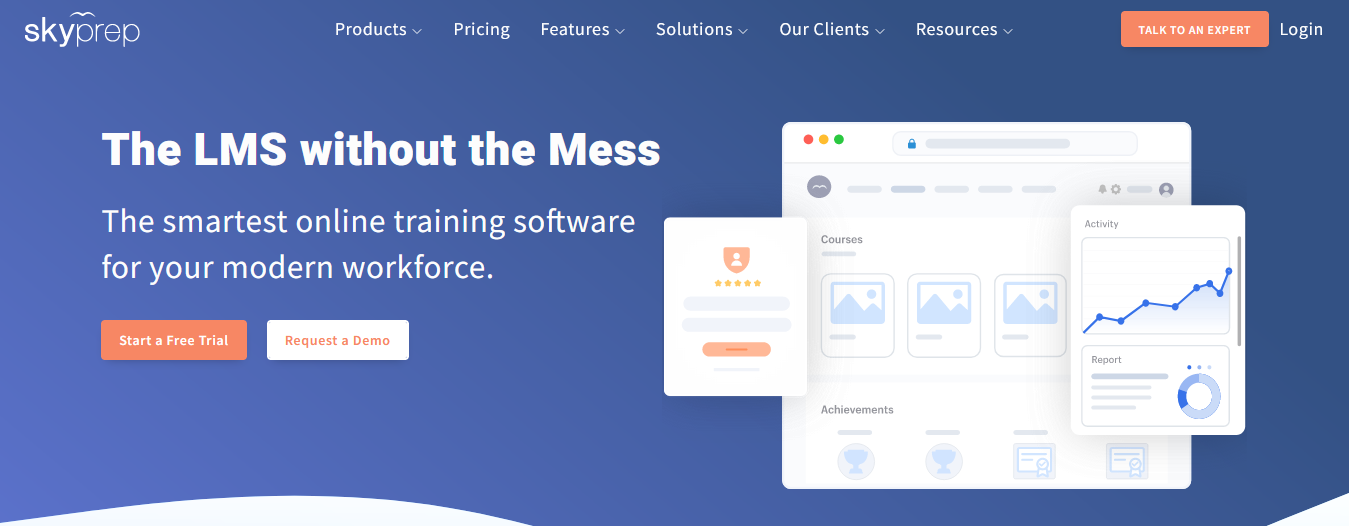
Their library of on-demand courses are designed to be tailored to your business and they offer powerful tools like quizzes, assignments, and forums that will help engage and motivate your learners. Additionally, they have comprehensive reports with key insights and metrics that let you measure success and change course as needed.
SkyPrep also offers features like Automation & Segmentation, which allow you to create personalised learning paths based on user preferences or goals. This ensures that the content is always relevant and useful for all your employees. Finally, their customer support team is available 24/7 so you can get help when needed. The GDPR compliant 24/7 online training software is compatible with tablet and smartphone devices.
2. Talent LMS
Getting the right LMS for your business can be tricky, but Talent LMS aims to make it easy. This cloud-based learning platform is designed to help businesses get up and running quickly and simply. With a wide range of features, Talent LMS allows you to customise every aspect of your courses and manage multiple users at once.
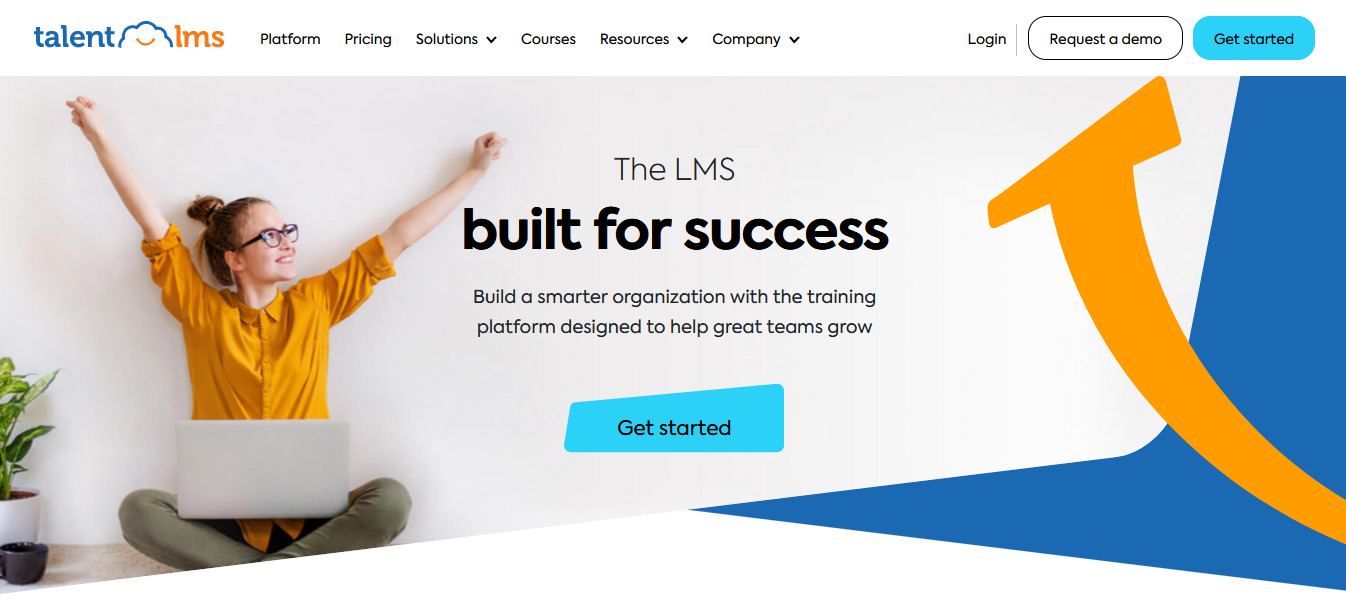
It’s also incredibly user-friendly. The drag and drop feature makes it easy to create engaging lessons—no knowledge of HTML needed! And if you’re worried about a smaller budget, Talent LMS has you covered. They offer a free plan with limited features, plus several paid plans with additional features.
Talent LMS is perfect for small businesses that want a big impact from their training programmes. It’s packed with enough features to give users access to interactive content like quizzes, discussions, surveys and more—all without breaking the bank. Plus, its cloud-based technology works on any device—PCs, tablets or smartphones—so you’ll be able to reach all employees regardless of their device or location.
3. Docebo LMS
Docebo LMS is a great choice if you’re looking for a simple and effective way to manage your learning programmes. It’s a cloud-based platform that offers a rich set of features, while also offering a wide variety of integrations. Plus, it’s easy to use and supports multiple languages and currencies.
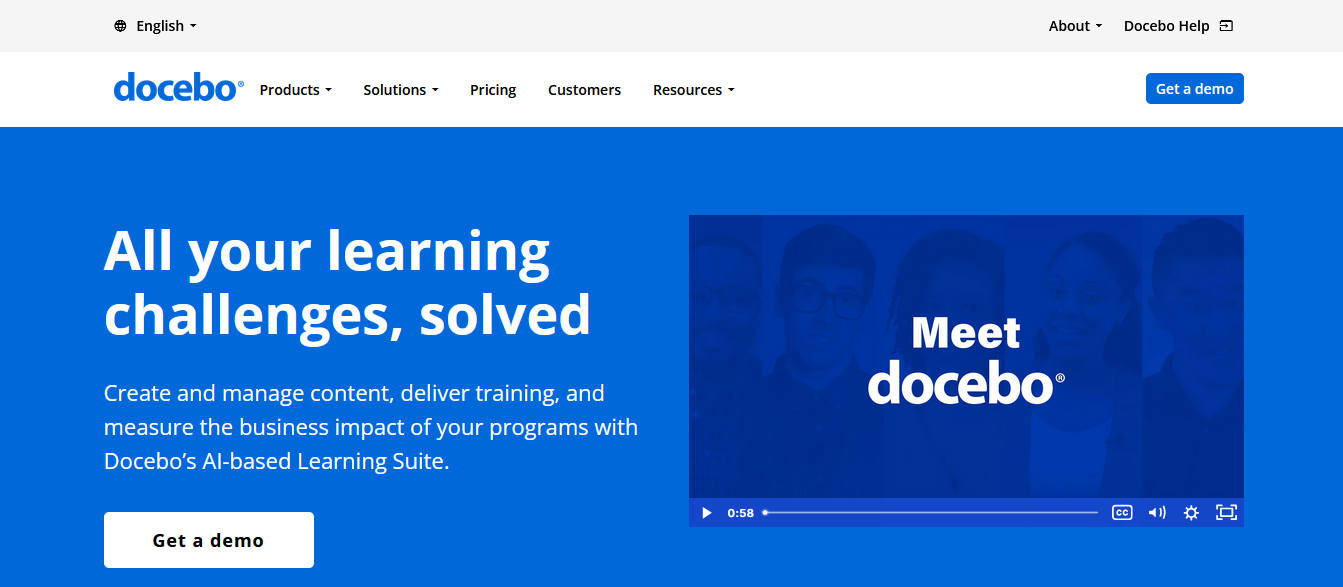
Here are some of the features that make Docebo LMS stand out from the crowd:
- Automated learning programme management, so you can instantly publish content and track progress
- Ability to assign courses, quizzes and other content quickly with just a few clicks
- Gamification element to encourage learners to become more invested in the learning process
- Secure access for users on any device
- Easy integration with third-party applications like SalesForce, Google Drive and Dropbox
- Reporting functionalities that allow you to track user performance in real time
Overall, Docebo is the best LMS for your business if you’re looking for an intuitive yet powerful platform to take your small business training programme to the next level.
4. Udemy for Business
Udemy for Business is a great choice if you’re looking for the best LMS for small businesses. It’s designed to improve the learning experience by providing engaging content, intuitive navigation, and comprehensive tracking and reporting capabilities.
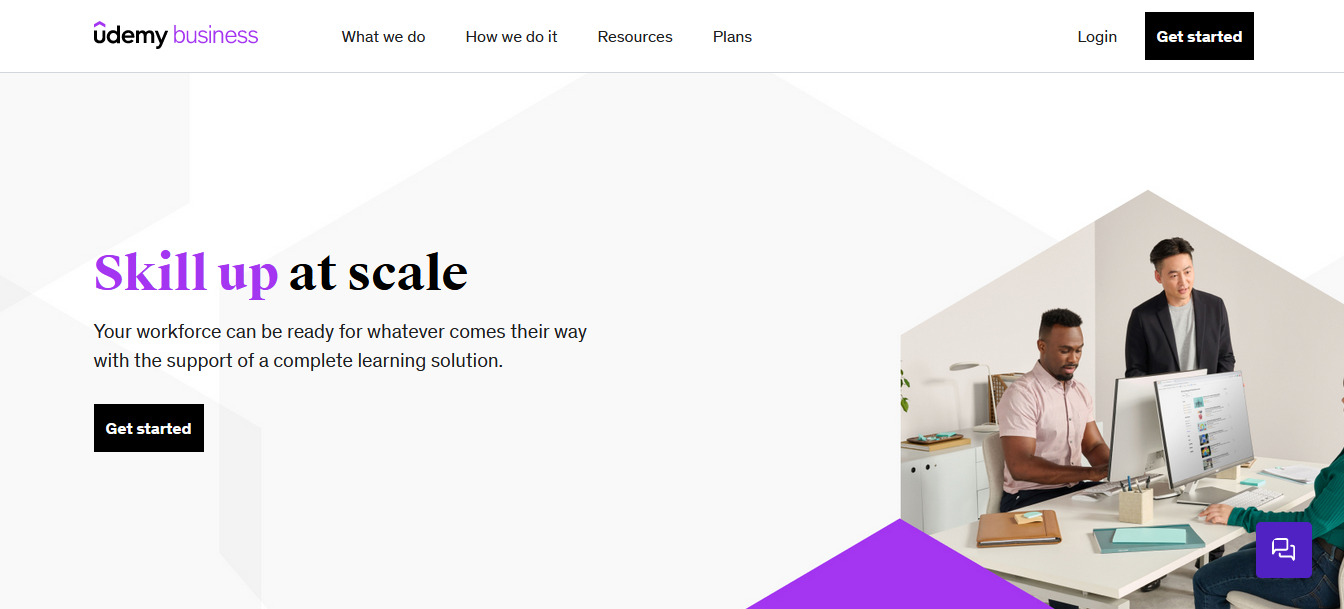
There are several key benefits of using Udemy for Business:
- Access to over 15,000 courses: You get access to over 15,000 top-quality courses covering a wide range of topics. These cover everything from IT, professional development and leadership skills, to digital marketing and more. So you can ensure the learning needs of your staff are covered.
- Customizable training: Udemy enables you to create custom playlists of content tailored specifically to the needs of your team or organisation. You can also add in external content, like videos or documents, if needed.
- Comprehensive analytics & reporting: Udemy also offers in-depth analytics and reporting that allows you to track user progress and performance over time. This helps you identify areas where further training might be required or where employees could use additional support.
- Easy setup: Finally, setting up Udemy is incredibly easy – no technical expertise is required! Just sign up for an account on their website and start adding in content right away.
5. iSpring Learn LMS
If you’re looking for something a bit more comprehensive, you should definitely check out iSpring Learn LMS. It’s a learning management system that can help you create, manage and track eLearning courses.
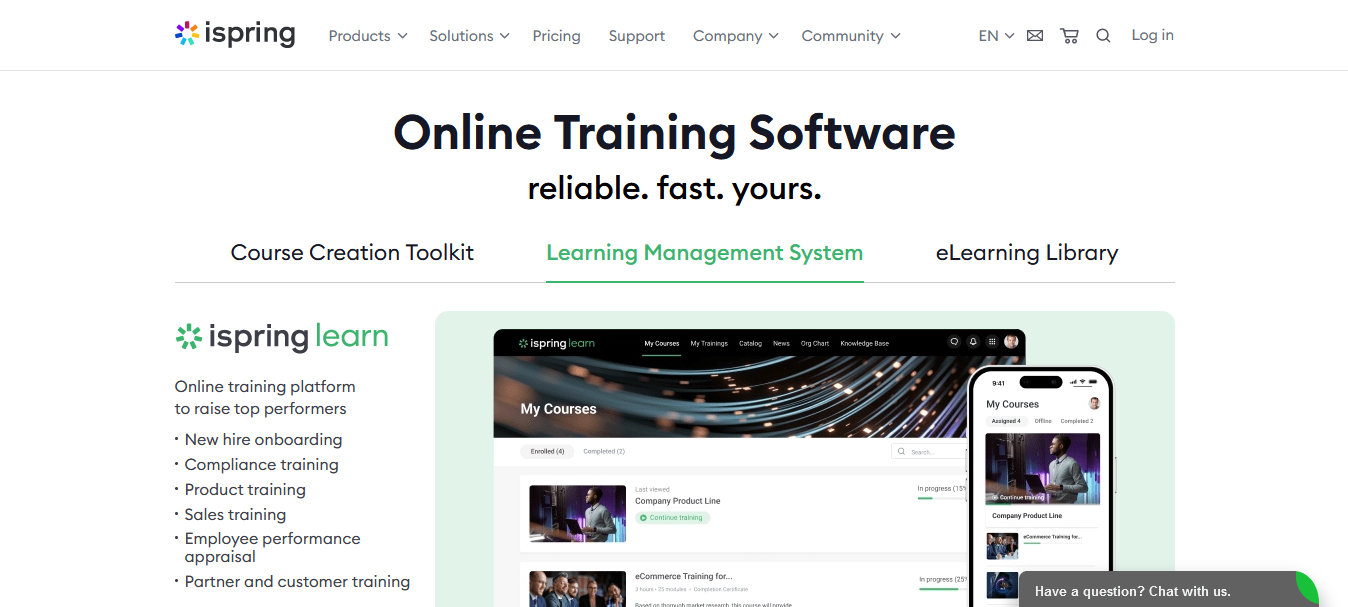
But what makes iSpring Learn stand out? Here are some features that makes it one of the best LMS for small business:
- Easy-to-use course creator for creating custom lessons with WYSIWYG text editor, animations, videos and quizzes;
- Automated SCORM / xAPI course certification;
- Reporting capabilities that lets you track completion rates and overall performance;
- Continuous learning possibilities with pre-made content libraries;
- Support for mobile devices and offline access.
Plus this LMS comes with lots of customization options, so you can design courses to match your corporate branding and style. And it’s easy to use too—it has an intuitive interface that even non-tech savvy users will find familiar quickly.
6. eFront LMS
If you are a small business owner looking for an LMS option, then eFront could be a great choice for you. It’s a cloud-based learning management system that gives businesses the ability to create, scale, and deliver online learning experiences.
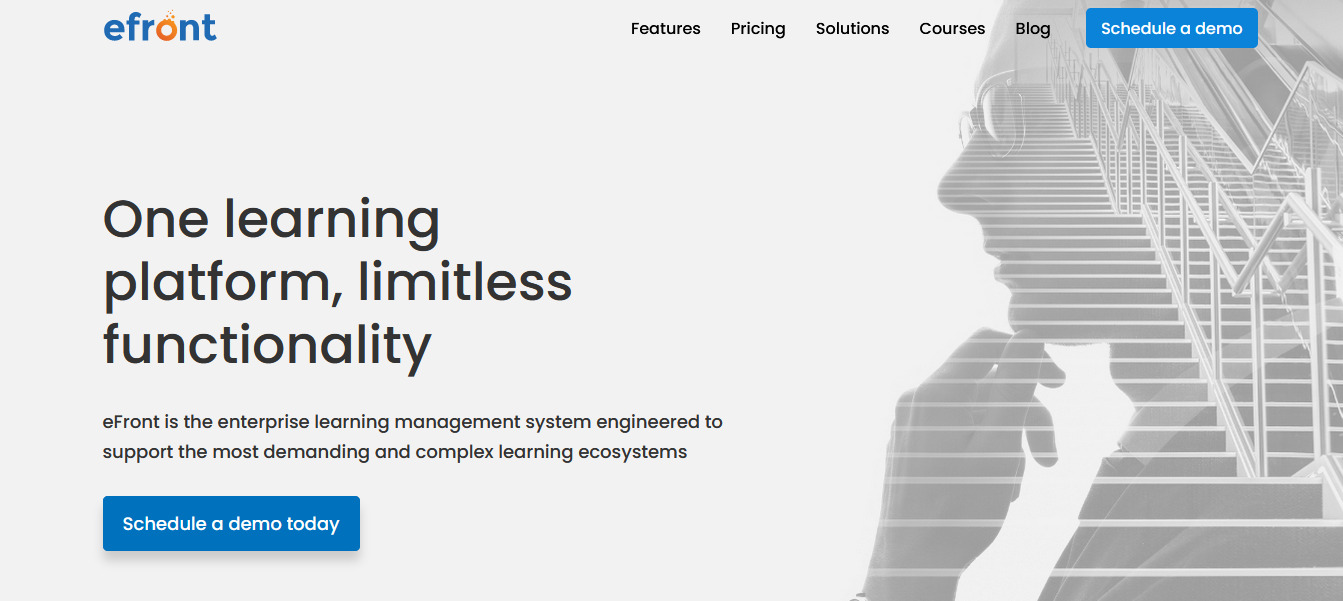
The platform allows businesses to customise their learning experiences to ensure they are both engaging and effective. Here are some of the key features that make eFront as one of the best LMS:
Course Creation & Design
eFront has several course design options, including drag-and-drop course builders, pre-built courses and customised options. These features make it easy for businesses to create courses quickly. They also have access to advanced tools like visual groups and student clustering for large classes.
Gamification & Certifications
eFront features powerful gamification tools that allow users to earn points and badges throughout their learning experience. This encourages learners to engage more with the platform, making it easier to get them interested in the material. Plus, when learners finish courses or pass tests they get certifications that prove their mastery of the topic – which is always useful for employees or customers (or potential customers!).
Mobile Learning & Analytics
eFront offers learners the ability to access and continue their training on mobile devices whenever they need to. This makes it easier for teams to stay on top of their training while on the go. Plus, businesses can view analytics to track progress and ensure that everyone is staying on track with their goals.
Overall, eFront offers a comprehensive suite of features designed specifically for businesses – from corporate training programmes to customer onboarding – making it an attractive option for small business owners looking for an LMS solution.
7. Coassemble LMS
You may have heard of Coassemble LMS, and for good reason: it’s one of the best learning management systems around for small business owners. Coassemble is cloud-based, so there’s no need to worry about installation or hardware requirements.
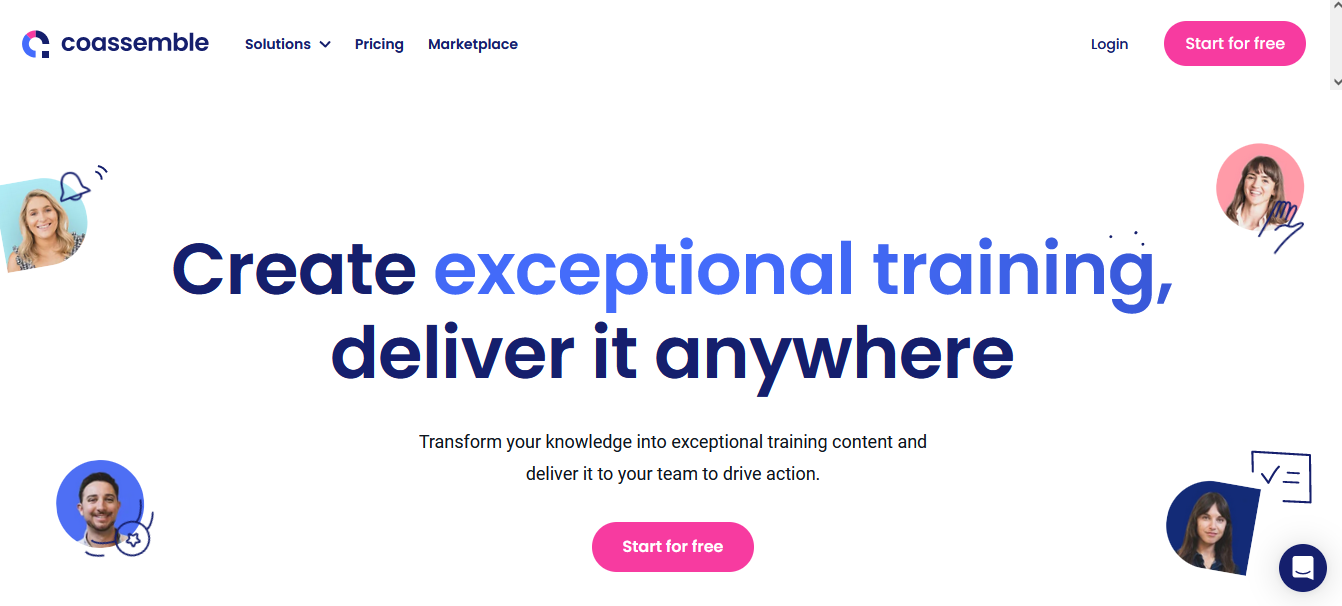
Automated Enrollment
With Coassemble, you can easily enrol learners and users via automated enrollment. This makes it easy to add new users and keep your classes full, without struggling with manual enrollment.
Reporting and Analytics
Coassemble also offers valuable reporting and analytics so you can assess progress and track how your students are doing. Turning data into actionable insights is essential in any business, but especially important in education. With Coassemble, you can get insights on how your students are faring in real-time so you can quickly assess their progress.
Easy Customization
Coassemble also makes it easy to customise course content according to your specific needs. You can create custom lessons, include multimedia elements like images, videos, or audio files, or simply drag-and-drop existing content into your lessons if desired. No matter what type of course you need to develop for your students, Coassemble has the tools needed to get the job done quickly and efficiently.
In short, if you’re looking for best LMS that is powerful yet easy-to-use for small business owners, then Coassemble is definitely worth considering!
8. Alma LMS
You may have heard of Alma LMS before—it’s widely considered as one of the top LMS solutions on the market, and it’s perfect for small businesses.
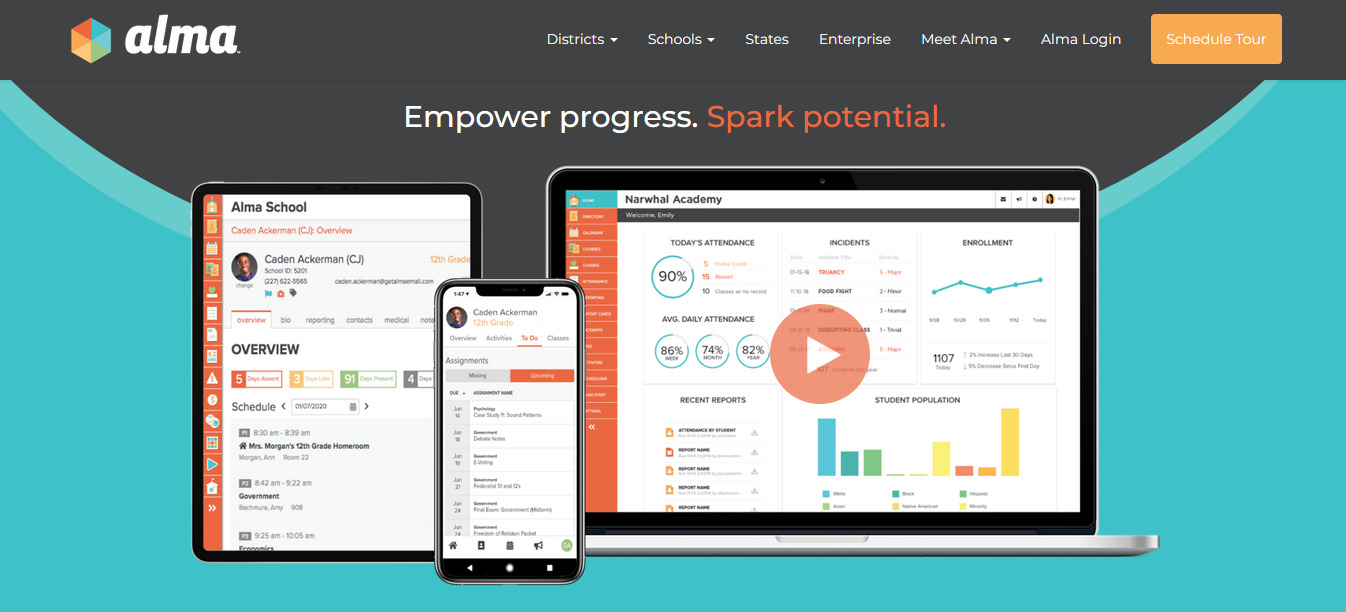
What makes Alma so great?
Easy to Use
It’s incredibly user-friendly, with a simple drag-and-drop interface that makes uploading content a breeze — no more dealing with clunky and outdated platforms.
Flexible & Scalable
Alma also offers highly customizable courses, so you can easily adapt existing courses to fit your needs and scale up or down as your needs change. You can also integrate with third-party tools and platforms like Zoom or Slack, and easily clone content across multiple courses.
Interactive Design Features
To keep learners engaged, Alma has a variety of interactive features like quizzes, polls, surveys, gamification elements and discussion forums. It also features an intuitive gradebook that helps you track progress in real time and quickly identify weak spots in subject areas.
All of these features make Alma a great solution for small businesses looking to up their training game without breaking the bank — making it one of the best LMS solutions out there.
9. WorkWize LMS
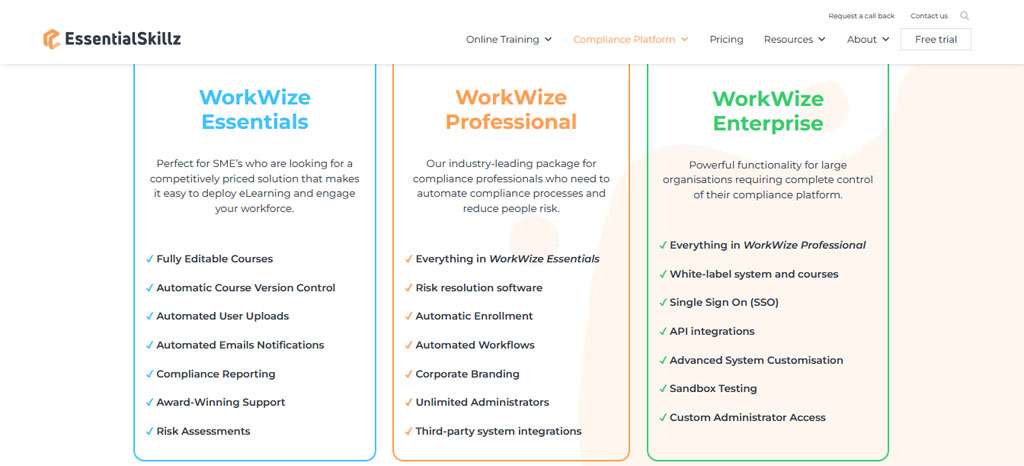
If you’re looking for an LMS solution that packs a punch at an affordable price, you might want to check out WorkWize. This platform is designed to help small business owners and entrepreneurs launch successful online training programmes quickly and easily.
The great thing about WorkWize is that it’s incredibly easy to use. It features a drag-and-drop interface that makes it simple to create the courses you need for your business. You’ll also have access to professionally-designed templates, so you don’t have to start from scratch when creating your courses.
What’s more, WorkWize also makes it easy to track and measure the effectiveness of your online training initiatives. With their powerful analytics and reporting tools, you’ll be able to get the insights you need to optimise your programme and get the results you want.
Plus, WorkWize is highly secure so you can rest assured that your data is safe and secure. Their encryption technology ensures that all data is kept private and secure, allowing learners to safely access your content without worrying about security breaches or data leaks.
10. Firmwater LMS
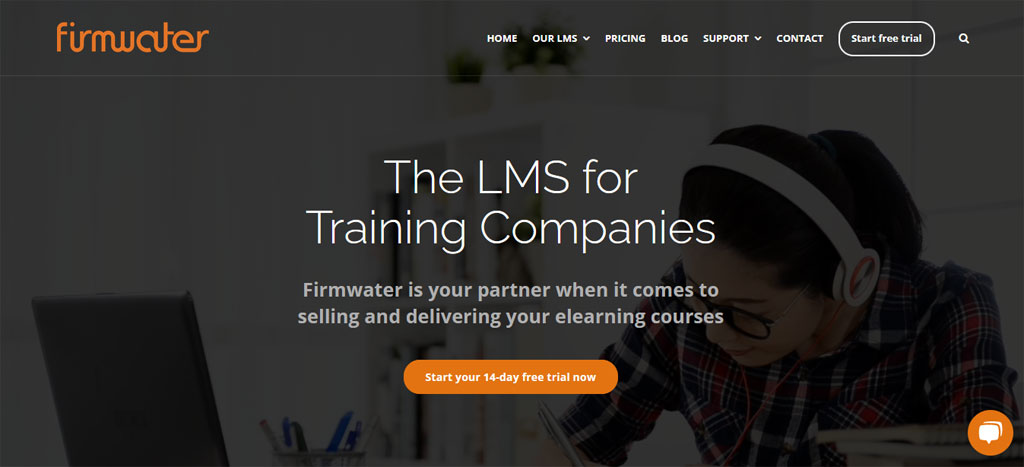
If you’re looking for an easy-to-use Learning Management System (LMS) that works for your small business, Firmwater LMS should definitely be on your list. The solution is cloud-based, and can be used from any device with an internet connection.
Easy Setup
Firmwater lets you get up and running quickly—its claim to fame is its intuitive platform. You can easily set up courses, assign certificates and track progress in real time. Plus, customization options let you tailor courses to fit your needs.
Advanced Analytics
The advanced analytics capabilities available in Firmwater are unmatched. You can get detailed insights into the learning progress of individual users or teams, and even generate reports to help you make informed decisions. Best of all? All this data is accessible in real time, so you can monitor progress as it’s happening.
Firmwater LMS also offers great support options with multiple channels available—from live chat to social media channels—so you can rest assured that help is just a few clicks away when you need it.
11. Schoology LMS
Schoology’s LMS is a popular choice for small business owners looking for an affordable and comprehensive learning management system. Schoology offers powerful features such as a drag-and-drop interface, robust analytics, and access to millions of shared resources, making it easy to create courses, assign tasks and track students’ progress.
With Schoology’s built-in collaboration tools, you can also easily communicate with students and colleagues in real time. You can share documents with anyone in your organisation or with the wider Schoology community, allowing you to discover new ideas and resources while tapping into the collective knowledge of your peers. Plus, Schoology is fully cloud-based so all your data is safely stored in the cloud, enabling you to access it anytime, anywhere.
Plus, if you’re on a budget or don’t need a tonne of features right away, Schoology offers a free plan that gives you all the essential tools needed to get started quickly. From here you can upgrade as needed when your business grows. With Schoology’s free plan and its more advanced plans at an affordable price point, it’s no wonder why this LMS is becoming increasingly popular among small business owners.
12. Blackboard LMS
If you’re looking for a top-tier LMS with lots of tools and features, then Blackboard LMS should definitely be on your radar. It’s packed with all sorts of features, including a drag-and-drop content management system, customizable catalogues, detailed tracking and reporting capabilities, support for multimedia content, and a mobile app. It also integrates with lots of other third-party applications and services like Zoom, Microsoft Teams, and Canvas.
Plus, Blackboard makes it easy to track your learners’ progress by giving you access to performance data from quizzes and surveys. Not only will this help you gauge how well your courses are doing, but it’ll also give you insights into the skills that need improvement.
Ultimately, Blackboard’s comprehensive set of features make it an ideal choice for small business owners looking for an easy-to-use and reliable learning management system.
13. Skillshare LMS
At number 13, you have Skillshare LMS. This solution is popular among small business owners because of its affordability and ease of use. You can choose from a variety of subscription plans, so you can pay only for the features you need. Plus, the learning management system integrates with different tools and services, like Zapier and Stripe, which makes it easier to manage your business.
The Skillshare LMS also has some great features to make sure that your learners have the best experience possible:
- It’s easy to assign courses or quizzes to different users and track their progress.
- You can customise course content with your own branding and add multimedia elements like videos and audio clips.
- It also has advanced reporting features so you can access real-time insights about how learners are engaging with your materials.
- Plus, it’s mobile-friendly so learners can access course materials from their phones or tablets if needed.
With all these great features in mind, Skillshare is definitely a top option for small business owners who are looking for a reliable learning management system that’s affordable and easy to use.
14. Absorb LMS
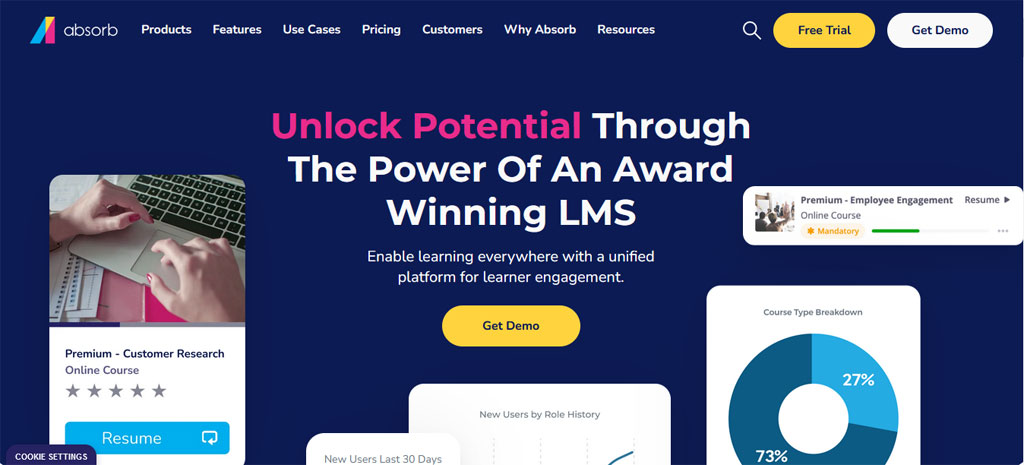
The 14th best small business learning management system is Absorb LMS. This software offers features that will help you create, deliver, and manage training for your business. It’s a powerful platform with plenty of flexibility to customise your learning content.
Absorb has a variety of unique benefits that make it an ideal choice for small businesses. Here are just a few of those advantages:
- You can create custom learning paths and access reports to track progress and analyse effectiveness.
- It integrates with over 1,200 applications so you can easily distribute your content across multiple channels, including mobile devices.
- You can create engaging experiences and assessments that help you evaluate proficiency.
- The administrative dashboard gives you total control over the user experience and lets you incorporate branding for a more personalised approach.
- Plus, Absorb makes it easy to manage users and track their progress in real-time so you can quickly identify areas where extra attention is needed.
Whether you’re looking to deploy specific courses or create a larger curriculum, Absorb LMS is sure to meet your needs as a small business owner.
15. Moodle LMS
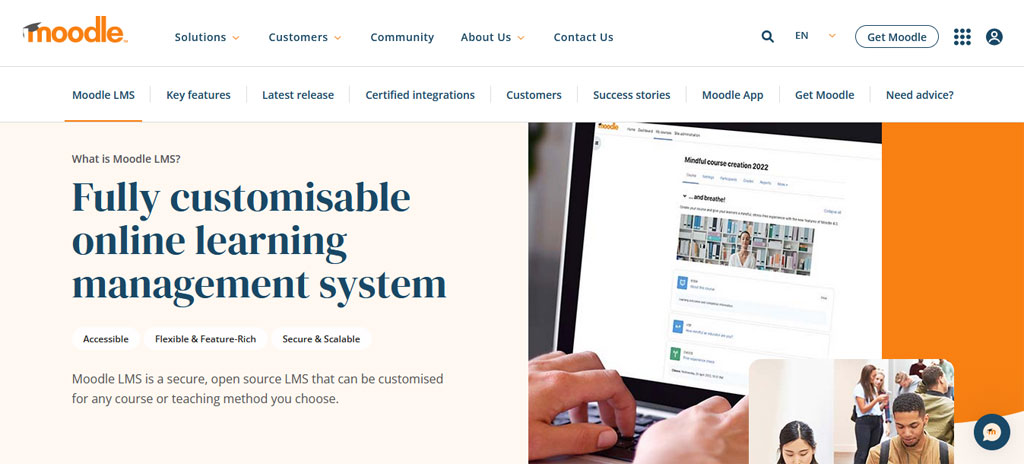
Moodle LMS is a great option for small business owners who are looking for an affordable and easy-to-use Learning Management System. Moodle is free learning management system (LMS), open-source software and can be used to create courses, track student progress, and even offer assessments.
Moodle allows you to do all of the following:
- Create and customise a wide range of courses.
- Track student progress throughout the course.
- Access flexible assessment tools such as quizzes and tests.
- Enable secure communication between teachers and students.
- Integrate with third-party software such as webinar platforms, content libraries, and other eLearning tools for a more comprehensive learning experience.
- Offer certificates to students who complete a course successfully.
- Leverage AI-based technology to improve learning experiences for students by making them more personalised and adaptive to each learner’s needs.
- Manage user roles, groups, permissions, profiles, etc., all from one central platform with Moodle’s customizable dashboard settings and tools.
- Finally access high-level security features to keep your eLearning data safe and secure at all times!
How to Choose the Right LMS for Your Business
Choosing a Learning Management System (LMS) solution for your small business isn’t always an easy task. Consider how user-friendly the LMS is for both learners and administrators. Ensure that it’s straightforward to use and navigate, no matter what level of technical savviness you or your employees have. Here are some more things to keep in mind as you make your decision:
Scalability
One of the most important factors when choosing an LMS is scalability. You’ll want to think about how many users you currently have and what your plans are for growth. Make sure you choose a system that can grow with your organisation over time.
Features and Functionality
Look at the features offered by each LMS to make sure that they meet your business needs and objectives. Ask yourself:
Do you need to track user progress?
Do you need automated notifications?
What about course completion certificates?
and decide which LMS have these features meeting your business requirements.
Some of the features you may want to consider include: an automated onboarding system, learning paths for employees, reporting functionality, analytics and tracking, e-commerce capabilities and online course building tools.
Cost Considerations
The cost of an LMS can vary significantly depending on the features you choose. Most companies offer monthly or annual subscription-based plans with feature tiers that offer more or less functionality based on your budget. It’s important to understand pricing models before committing to a solution so that you’re not getting overcharged for features you don’t need.
Integrations and Support
You also have to consider how well an LMS integrates with other systems in order to keep everything running smoothly. Look at what integrations are available—such as APIs, payment processors, email platforms and third-party systems—and make sure they meet your needs. Lastly, look into customer service options like training materials and customer support should any issues arise.
By taking these considerations into account before signing up for an LMS solution, you can make sure that it meets all of the needs of your business before making a commitment.
Conclusion
Large or small, investing in an LMS is an excellent way to enhance employee training and ensure everyone stays on the right track. With so many great LMS solutions available, small business owners have the ability to tailor their learning management system to the needs of their organisation. From affordability to versatility, the key to finding the right LMS is doing research and finding the platform that best fits your budget and organisational goals.
Think carefully about the resources you have at hand, what you need, and don’t be afraid to ask questions and seek guidance. Once you’ve chosen the right LMS, you can rest assured that your employees will have the skills and knowledge they need to increase efficiency and productivity -all the while keeping costs down and optimising performance.


